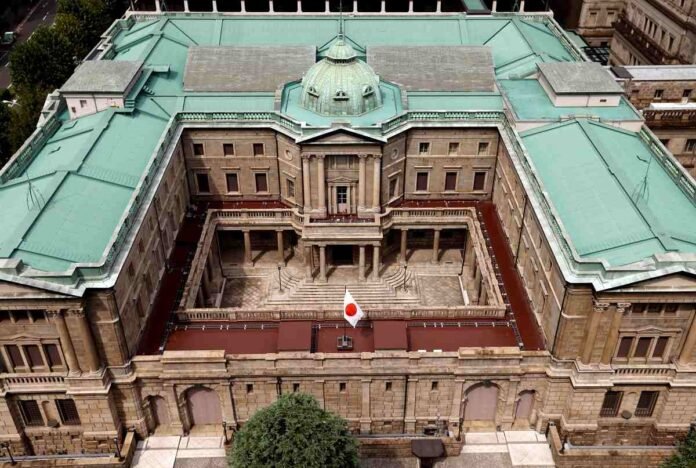The Bank of Japan is seen in Tokyo
16:55 JST, July 16, 2024
TOKYO (Jiji Press) — Bank of Japan policymakers were largely optimistic about the impact of a consumption tax hike in the first half of 2014 but failed to accurately predict subsequent economic and price developments, transcripts of BOJ policy meetings showed Tuesday.
The consumption tax rate was raised from 5% to 8% in April 2014, about a year after the central bank launched its quantitative and qualitative monetary easing policy. This policy involved doubling purchases of Japanese government bonds to reach its 2% inflation target in about two years.
The BOJ Policy Board held seven meetings on monetary policy in January-June 2014, this time releasing transcripts of comments from participants. At one of those meetings, then-Governor Haruhiko Kuroda said the impact of the tax hike was “within expectations.”
At all seven meetings, BOJ policymakers unanimously decided to keep the main elements of monetary policy intact.
The new policy framework had sent Japanese stocks higher and the yen lower, and business sentiment improved. Even the core consumer price index had turned around after a long decline, posting a year-on-year increase of 1.5 pct in April 2014, excluding the impact of the tax hike as estimated by the BOJ at the time.
In its Outlook for Economic Activity and Prices report, adopted at a policy meeting on April 30 that year, the BOJ forecast that the core CPI rate excluding the impact of the tax hike would fall below 1.5 percent and then rise from the second half of fiscal 2014 to 1.9 percent in fiscal 2015 and 2.1 percent in fiscal 2016. Confidence that the inflation target would be met was “increasing,” then-Vice Governor Kikuo Iwata said.
At a meeting on June 13, 2014, then-Vice Governor Hiroshi Nakaso said he saw the decline after the peak in demand that preceded the tax hike, but that the development was within the expected range.
Many other policymakers, including Iwata, agreed that prices were moving in line with the BOJ’s main scenario. Kuroda expressed confidence in achieving the inflation target, concluding that “there was no change in the underlying trend of prices even after the consumption tax increase.”
Meanwhile, some members of the Policy Board were cautious about the outlook for prices. Member Sayuri Shirai cited a risk that a decline in real income would affect the underlying trend in consumption.
At the April 30 meeting, Takahide Kiuchi, another policymaker, said it was highly likely that the positive impact of the yen’s depreciation on prices would gradually fade, and argued that inflation would fall below 1 pct in or after the summer. Member Takehiro Sato said he saw significant uncertainties about the feasibility of the inflation target around fiscal 2015.
After the tax hike, consumption became sluggish. The growth of the core CPI ratio excluding the impact of the tax hike also shrank to around 1 pct in August and September 2014, also weighed down by lower crude oil prices and the fading effect of the yen’s depreciation.
The BOJ’s scenario collapsed, forcing it to implement further easing, including an increase in Japanese government bond purchases in October of that year.



